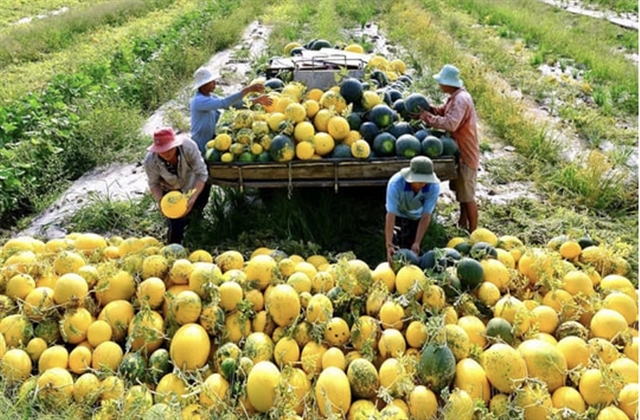 Economy
Economy


|
| Farmers in a cooperative in Vĩnh Long harvest agricultural produce. — Photo vnbusiness.vn |
VĨNH LONG — The collective economy in Vĩnh Long Province has been gaining significant momentum, driven by policies that provide timely financial, technical and human resource support.
These measures are enabling cooperatives to expand production, apply advanced technology, and integrate more deeply into sustainable value chains.
The Vĩnh Long Cooperative Alliance has played a central role in connecting cooperatives with preferential investment policies, concessional loans and support from the Cooperative Development Support Fund.
It has also encouraged cooperatives to participate in trade fairs, exhibitions and trade promotion events, while promoting the digital transformation of sales channels by putting products on e-commerce platforms.
In addition to financial aid, the province has placed strong emphasis on developing human resources.
Managers and young staff are receiving training in governance and market access, while highly qualified workers are being attracted to work in cooperatives through salary support schemes.
Study tours and exchanges with successful models in other provinces are also being organised to enhance capacity and broaden perspectives.
Technology and innovation
Technological application has emerged as a breakthrough to improve productivity, product quality and competitiveness.
Cooperatives are being supported to meet production standards such as VietGAP and organic farming, adopt high-tech agricultural practices, and establish safe and sustainable production–consumption chains.
Those with demand are also assisted in registering intellectual property rights and building traceability systems for their products.
By 2026, the province aims to establish 30 new cooperatives and one to two cooperative unions, ensuring that every commune has at least one cooperative operating under the 2023 Cooperative Law.
It plans to develop two to three model cooperatives that embrace green production aligned with local key products, and three to five high-tech cooperatives specialising in agricultural production and consumption.
Annual cooperative revenue and profit are targeted to increase by at least 10 per cent, while average incomes of members and workers are expected to reach VNĐ60 million (US$2,360) per year.
Furthermore, over 60 per cent of cooperative managers are expected to achieve vocational qualifications appropriate to their sector of operation.
Expanding the cooperative network
Currently, Vĩnh Long is home to 510 cooperatives with nearly 82,250 members and a charter capital of more than VNĐ687 billion ($27 million), creating jobs for over 7,200 workers.
To date, 19 cooperatives have accessed loans totalling nearly VNĐ10 billion ($394,000) from the Cooperative Development Support Fund.
They have also tapped into other sources such as the Farmers’ Support Fund and the National Employment Fund.
Since the beginning of this year, nearly 20 cooperative managers and members have joined study tours outside the province, while 60 cooperatives have showcased products at trade fairs and promotional events across the country.
According to Thái Phước Lộc, chairman of the Vĩnh Long Cooperative Alliance, cooperatives that receive timely support in capital, training and trade promotion often achieve very positive results.
“With this support, many cooperatives have been confident to expand production, apply technology, build brands and gradually join value chains, which in turn improves member incomes and contributes to sustainable local development,” he said.
Phát Tài Agricultural Cooperative in Châu Thành District, founded in 2017 with 115 members, is one of the successful examples.
Benefiting from support under the national project on developing one million hectares of high-quality, low-emission rice in the Mekong Delta by 2030, the cooperative is currently investing VNĐ3.9 billion ($154,000) in a warehouse and rice drying facilities, of which VNĐ2.1 billion ($83,000) is funded by the provincial budget.
These facilities are expected to help reduce post-harvest losses, improve rice quality and strengthen the cooperative’s processing capacity.
Thành Chí Seedless Lime Cooperative in Tân An Commune, established in 2022, is another example.
With 113 official and associate members, it manages 185 hectares under linked production and purchase contracts.
Around 80 per cent of its members have accessed loans of VNĐ50 million ($1,970) per household from the Farmers’ Support Fund.
In addition, two cooperative technicians are receiving salary support for three years under the provincial policy to attract highly qualified staff.
The cooperative has also been provided VNĐ1.8 billion ($71,000) from the State budget to build a warehouse, which is expected to be completed by the end of this year.
Thanks to this support, cooperative members have been enjoying substantial profits. Farmers linked to Thành Chí are earning average profits of VNĐ500–600 million ($19,700–23,600) per hectare per year, while official members receive annual dividends.
The cooperative is now planning to expand its farming area to 300 hectares by 2027. — VNS




